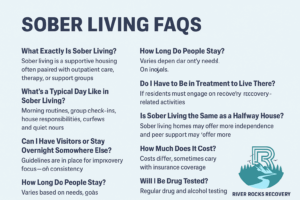Considering sober living can feel exciting and intimidating at the same time. You might be curious about what it’s like, what’s expected, and whether it’s the right fit for you—or for someone you care about.
At River Rocks Recovery, we know questions come before courage. This guide answers some of the most common ones, so you can move forward with clarity and confidence.
What Exactly Is Sober Living?
Sober living is a supportive housing option for people who want a safe, structured environment while working on their recovery. It’s not a treatment program, but it’s often paired with outpatient care, therapy, or community support groups.
Think of it as a bridge between treatment and fully independent living—a place where you can keep building stability without being thrown into the deep end.
Do I Have to Be in Treatment to Live There?
Not always. Some residents are currently in outpatient programs; others have completed treatment and want to strengthen their foundation before living on their own.
If you’re not in treatment, you’ll still be expected to engage in recovery-related activities like meetings or counseling, which helps keep you connected and supported.
What’s a Typical Day Like in Sober Living?
Every house is different, but most include:
- Morning routines and group check-ins
- Time for work, school, or appointments
- House responsibilities like cooking or cleaning
- Curfews and quiet hours in the evenings
It’s structured enough to keep you accountable, but flexible enough to let you live your life.

How Long Do People Stay?
It depends on your needs and goals. Some people stay for a few months, others for a year or more. The length of stay is less about a number and more about when you feel ready and equipped to maintain your recovery independently.
Many residents find that the longer they stay, the stronger their new habits become—and the more confident they feel about living on their own.
Can I Have Visitors or Stay Overnight Somewhere Else?
Most sober living homes have clear guidelines about visitors, overnight passes, and time away. These rules aren’t meant to be restrictive—they’re in place to keep the house environment safe and focused on recovery.
You’ll usually have more flexibility as you demonstrate consistency and reliability.
Is Sober Living the Same as a Halfway House?
Not exactly. While both provide housing for people in recovery, sober living homes are often privately run and may offer more independence, amenities, and peer support. Halfway houses are typically state-funded and may have more rigid requirements. If you’re considering a Sober Living Program in Monroe, Ohio, it’s worth noting that these programs are designed to support long-term recovery through structure and community—not just to fill time after treatment.
The philosophy behind sober living is about creating a community of peers who are actively working toward the same goal, not just housing people until a sentence or program ends.
How Much Does It Cost?
Costs vary based on location, amenities, and whether utilities or meals are included. Many people pay out-of-pocket, though some expenses may be offset by insurance if you’re in a treatment program at the same time.
Our team can walk you through the financial details so there are no surprises.
What Should I Bring With Me?
Pack as if you’re moving into a shared apartment. You’ll need:
- Clothing for different seasons
- Personal toiletries
- Bedding, if not provided
- Any personal items that make you feel at home (photos, books, etc.)
Avoid bringing anything that could be a recovery trigger, and check with the house about any restrictions before you move in.
How Do I Prepare Emotionally?
Moving into sober living isn’t just a logistical shift—it’s an emotional one. You may feel a mix of hope, fear, and uncertainty. That’s normal.
It can help to:
- Talk to current or former residents about their experience
- Be honest with yourself about what you want from the experience
- Keep an open mind about living with others in recovery
Remember—sober living is meant to support you, not test you.
Will I Be Drug Tested?
Yes. Regular drug and alcohol testing is standard in sober living homes. This isn’t about “catching” you—it’s about maintaining a safe environment for everyone.
Most residents say testing becomes a non-issue quickly because it’s simply part of the structure that helps them stay accountable.
Can I Work or Go to School While in Sober Living?
Absolutely. In fact, most programs encourage it. Having work, school, or volunteer commitments can be an important part of building a healthy, independent life.
Schedules are usually designed to make space for these responsibilities while still requiring participation in house activities.
What If I Don’t Get Along With My Housemates?
Conflict can happen in any shared living situation. Sober living homes usually have house managers or peer leaders who can help mediate issues.
Learning to live and communicate with others is part of the growth process, and many residents leave with stronger interpersonal skills than they came in with.
What Happens If I Relapse?
Rules vary, but most programs require residents to leave immediately if they use drugs or alcohol. This isn’t about punishment—it’s about protecting the sobriety of others in the house.
In some cases, you may be able to return after re-engaging with treatment or completing detox. The focus is always on safety and support.
Is Sober Living Right for Me?
If you want to strengthen your recovery in a safe, supportive environment—especially if you’re not ready to live alone—it could be a great fit.
It’s not about admitting weakness; it’s about setting yourself up for long-term success. Many people credit sober living with giving them the tools, friendships, and structure that kept them on track for years to come.
Sober living isn’t about starting over—it’s about continuing forward with the right support around you. If you think it might help you or someone you love, we’d be honored to walk you through the next steps.
Call (888) 905-6281 to learn more about our sober living services in Middletown, Ohio.




























